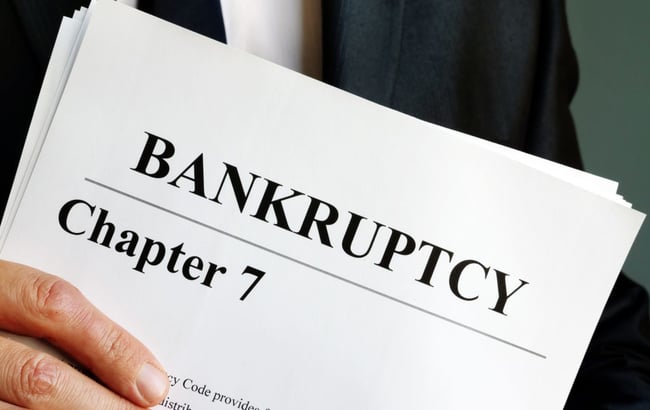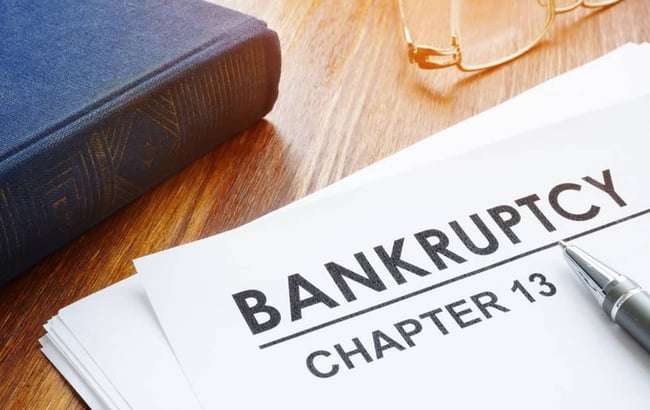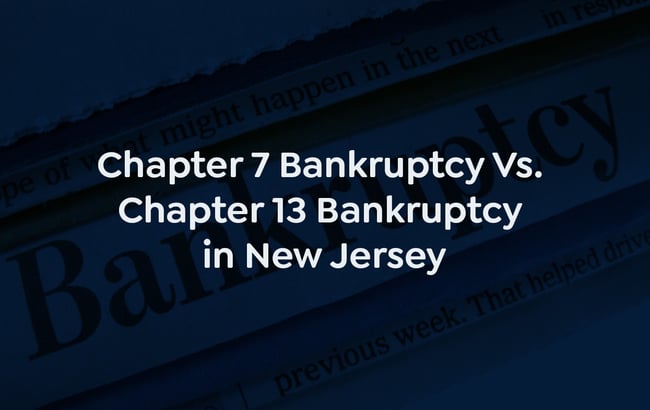Scura, Wigfield, Heyer, Stevens & Cammarota Blog
- Blog
Chapter 7 Bankruptcy Vs. Chapter 13 Bankruptcy in New Jersey

Illness, divorce, foreclosure, and job loss—almost everyone will face one or more of these issues at some point in their lives, if not all of them at the same time. If you've ever been in this scenario—or are now in one—then you probably know how fast the clutches of debt can come festering on your finances.
The tale turns sourer when you find the swathes of debt collectors under the employ of your creditor who’re snarling at your properties for debt recovery like a pack of ravening wolves. If left unresolved, the entire dilemma could put you and your family’s economic welfare in jeopardy.
The average debtor would struggle to get back on their feet without a safety net. This is where the concept of declaring Bankruptcy comes in to provide relief under the law for anyone saddled with considerable debt. They then start afresh without the hassle of offsetting overbearing piles of bills — or debt.
Bankruptcy In New Jersey
When it comes to bankruptcy in the United States of America, there is a framework in place to navigate its murky waters, with the most recent of these laws being the Bankruptcy Reform Act of 1978. The Bankruptcy Code, also referred to as ‘Title 11’ of the United States Code, serves as a guide to businesses and individuals looking to commence filing for bankruptcy to stabilize their financial health.
In the state of New Jersey, various forms of Bankruptcy exist to help people offset lingering debts and payments that may go under the radar. A New Jersey attorney can always give you the inside scoop on the options of Bankruptcy declaration available to you and which one best suits your needs.
Generally speaking, these types include Chapter 7, Chapter 13, and Chapter 11 Bankruptcy. It’s vital to understand how these forms of Bankruptcy work to help free individuals and businesses from debt before commencing the process. Knowing which form is best for you is essential to you getting the most utility out of the filing.
NJ bankruptcy attorneys ( . . . raising our hands) can always chip in with top-of-the-shelf legal analysis given the facts surrounding your prevailing circumstance, to assist you.
What is a Chapter 7 Bankruptcy in NJ?

Chapter 7 Bankruptcy is also known as the Liquidation Chapter of Bankruptcy. Under Chapter 7 Bankruptcy, a debtor is entitled to keep hold of some of their assets. In contrast, the remaining assets are sold or distributed to their creditors to partially satisfy the debt (usually unsecured debt such as credit card debt). The sale of assets for the purpose of discharging the debt is made by a bankruptcy trustee, usually appointed by the court. Most of our clients filing a Chapter 7, however, do not lose any assets and if it appears that assets may be at risk we usually direct the person or business to another Chapter in Bankruptcy.
Cost
Attorney’s fees include the cost required in filing for Chapter 7 Bankruptcy, besides the $338 court filing fee (inclusive of $78 miscellaneous administrative and $15 trustee fee). However, if you make less than $1,600 per month or less than 150% of the federal poverty guidelines as monthly income, you qualify to apply to have the court fees waived.
How Long Does it Take?
The process of a Chapter 7 Bankruptcy takes an average of four to six months from the initial credit counseling to the point where the court discharges your remaining debts. In certain cases, it can take longer than six months in cases where, for instance, your trustee requires you to submit additional documents or has a hard time selling your property to pay off your creditors.
Typically, the estimated timeframe for Chapter 7 bankruptcy is a maximum of six months. If complications arise, the case may last longer.
Who can File?
Individuals or businesses can file for Chapter 7 Bankruptcy, regardless of whether such entities are high-income earners or low-income earners. With individuals you must first see whether they are over the median income level. If below the median income level, an individual qualifies for a Chapter 7. If over the median income level, they’re also required to pass the ‘means’ test so another step is involved. This test limits the use of Chapter 7 Bankruptcy to those who do not have excess disposable income. In other words, the ‘means’ test helps you determine whether your income as compared to expenses is low enough for you to file for Chapter 7 Bankruptcy.
The ‘means’ test deducts a certain amount of monthly expenses from your current monthly income for up to six months before the date you apply for Chapter 7 Bankruptcy. These deductions will, in the end, show your disposable income. Disposable income is the income you have available to discharge your debts to any extent. The higher your disposable income is, the more difficult it will be for you to avail yourself of the Chapter 7 Bankruptcy remedy.
Instead of qualifying for a Chapter 7, you may be required to use your disposable income under Chapter 13 to pay off your creditors once realized that your income could cover some or all of your debts.
It is vital to note that the ‘means’ test framework is used only for those filing for bankruptcy with primarily consumer debts and not business debts. Also, you are exempt from the ‘means’ test if you’re a disabled veteran or incurred your debt during active duty or while performing a homeland defense activity.
The first step to determine whether or not you can file for Chapter 7 Bankruptcy using the ‘Means’ test is simple. You have to look at whether your income is higher or lesser than the median income for households of your size in New Jersey. Across the US, different states have different values for median income. You can always rely on the expertise and guidance of an attorney based in NJ to help you make this assessment.
If your income is higher than the median income in NJ, you will have to take a second look at how much disposable income you have to pay off at least a portion of your unsecured debts after deducting certain expenses. If your disposable income is more than the stipulated amount, then you’ve failed the means test — and will not qualify for Chapter 7 Bankruptcy but will usually be eligible for a Chapter 13 Bankruptcy.
That said, if your income is originally lower than the state’s median income, then you qualify to file for Chapter 7 Bankruptcy.
Advantages of a Chapter 7 Bankruptcy
Chapter 7 Bankruptcy holds a ton of benefits for those who choose to file under its framework. It’s fixed in nature and does not require periodic repayments of any sort for dealing with your debts. There’s also no minimum amount of debt required to qualify for Chapter 7 bankruptcy.
You get the protection from collection efforts of creditors effectual from the exact date you choose to file, and a Chapter 7 bankruptcy gives you a fresh start. Like we mentioned earlier — under the federal laws you are entitled to the relief wherein after the debt is discharged, the only debts you’d be mandated to offset (pay) will be secured assets that you wish to retain and keep. You can also wipe our secured debts in a Chapter 7 but may lose the collateral that the debt is secured by. Secured debts (Debt backed by collateral to reduce lending-related risk) for which you can opt to sign a ‘Reaffirmation agreement.’ (Click here to view a sample of a Reaffirmation agreement form). If you reaffirm debt, you can keep the collateral.
Disadvantages of a Chapter 7 Bankruptcy
A Chapter 7 Bankruptcy record can stay on your credit report for up to 10 years from the date you file for it. Plus, you only get to keep exempt property — those protected by state and federal laws – while your other assets, which are not covered by New Jersey Bankruptcy exemptions, are taken over by a bankruptcy trustee who sells these assets to discharge your debts.
Also, the automatic stay order that stops creditors’ collection efforts is only a temporary defense in certain cases. For instance, in cases where you are facing a foreclosure on your home. Lastly, after filing the first case for bankruptcy and receiving a discharge of your debts under Chapter 7, you can only file another case eight years after the first case.
When is a Chapter 7 Better Than Chapter 13?
A Chapter 7 bankruptcy works out better than Chapter 13 when you’re seeking a fresh start to discharge your debts swiftly and without the need for repayments.
What is a Chapter 13 Bankruptcy in New Jersey?

A Chapter 13 bankruptcy in NJ involves the debtor proposing a three to a five-year repayment plan to their creditors to pay off part or all of the debt owed from the debtor’s future income.
Chapter 13 bankruptcy is often used to prevent home foreclosure, cover overdue mortgage payments and car loans, and pay back taxes.
How Much Does it Cost?
The cost of court filing fee for Chapter 13 bankruptcy is a $313 court filing fee (this includes a $78 miscellaneous administrative fee). This is not the attorney fee, however. Typically, each firms have their fee structures, so, for the most part, the cost ultimately depends on the firm. But you want to ensure that the attorney you hire is in good standing with the state bar where you are filing for bankruptcy.
You can always let the track record or previous work of your attorney speak for them by checking reviews from past clients. They are, more often than not, a reliable indicator of the attorney’s professional conduct. You also want to make sure you’re hiring the services of a firm with NJ bankruptcy attorneys that can give you all the personal attention you need when filing.
How Long Does it Take?
The process of filing a Chapter 13 bankruptcy usually takes between three to five years in which the debtor will be required to pay back some or all of the debt owed.
Who Can File?
Persons who can file for Chapter 13 bankruptcy must have a ‘regular source of income’ and some disposable income which you can apply towards your payment plan for years to come.
Limits have been set on the amount of secured and unsecured debts covered under Chapter 13 bankruptcy. As of the date of this article, Section 109(e) of the Bankruptcy Code provides a limit of $419,275 for unsecured debts and $1,257,850 for secured debts. These limits are adjusted under the Code every certain number of years.
These secured debts include, but are not limited to, liens and mortgages secured against real estate and other collateral such as vehicles, equipment, electronics, jewelry, etc. On the flip side, unsecured debts include the total of all amounts owed by an individual on credit cards, medical bills, lines of credit, unsecured taxes, and other debts not secured by collateral.
Advantages of a Chapter 13 Bankruptcy
Chapter 13 Bankruptcy is regarded as the best way to handle certain problems that will not be resolved by mere bankruptcy. These problems majorly include curing a default on a mortgage and repaying taxes. Also, Chapter 13 bankruptcy allows you to settle debts with a payment structure and protects your properties from creditors/debt collectors looking to take control of your assets to pay off your debts.
Through the automatic stay order, which is also available under Chapter 13, you are protected by law from calls, contacts, and anything that may interfere with the quiet enjoyment of your assets. Bear in mind that this legal protection is in play while you make payments over a three to five-year period according to the payment plan you have made with the court.
Chapter 13 bankruptcy also allows you to keep your non-exempt property from being sold by a bankruptcy trustee to discharge your debt. You can file for Chapter 13 bankruptcy at any time, and you can file repeatedly.
Disadvantages of a Chapter 13 Bankruptcy
A completed Chapter 13 Bankruptcy record can stay on your credit report for up to seven years from the date in which you file for bankruptcy. You will also be required to make monthly payments over a three to five year period according to a strict plan monitored by the court which may become inconvenient at any time.
Also, the duration for the discharge of debt under Chapter 13 — three to five years — is extended compared to other chapters that are lesser in duration, such as Chapter 7, which takes four to six months to complete.
When is a Chapter 13 is Better Than Chapter 7?

There are instances where filing for a Chapter 13 Bankruptcy will be of more benefit to you than a Chapter 7 Bankruptcy, even when you qualify for Chapter 7.
For instance, Chapter 13 allows you to make up for missed payments or arrearage on car loans or mortgages. Impliedly, you can successfully make their overdue payments over time, reinstate the original agreement, and retain your property after such payments. This option is unavailable under Chapter 7.
Chapter 13 will also allow you to pay off in full and over three to five years non-dischargeable tax and domestic support debts, which cannot be dealt with under Chapter 7.
If you seek to keep some of your assets that are not protected by state or federal law under Chapter 7 bankruptcy, it becomes better to opt for Chapter 13, allowing you to protect such assets. You will, however, be required to make payments to keep those assets besides your budgeted payment under a court order.
Chapter 13 bankruptcy also provides you with protection against foreclosure on your home by your creditor so long as you meet the plan’s terms.
How to Know if I Should File a Chapter 7 vs 13 Bankruptcy?
While you can always conduct personal research to determine which form of bankruptcy works best for you, it is highly recommended that you seek professional advice.
Our attorneys are on standby to take stock of your situation and easily provide you with all information you need to understand at a basic level to decide. Our NJ bankruptcy attorney will guide you.
Share Article
Need Help? Contact Us Today!





Lists by Topic
- Bankruptcy (323)
- Personal Injury (95)
- Chapter 13 (52)
- Chapter 7 (51)
- Debt Management (50)
- Foreclosure (47)
- Accident (32)
- Car Accident (27)
- Chapter 11 (25)
- Business Bankruptcy (20)
- Insurance Claims (19)
- Credit (18)
- Business Law (13)
- Employment Law (12)
- Litigation (12)
- Probate and Estate Law (11)
- Damages (10)
- Medical (10)
- Product Liability (10)
- Workers Compensation (10)
- Attorney (9)
- Consumer Bankruptcy (9)
- Commercial & Residential Real Estate (6)
- Slip and Fall (6)
- Contracts (5)
- Premises Liability (5)
- Repossession (5)
- wrongful death (5)
- Video | Bankruptcy (4)
- Bankruptcy Cost (3)
- Corporate Litigation (3)
- Trial Law (2)
- student loans (2)
- tax (2)
- Attorney Fees (1)
- COVID-19 (1)
- Certified Civil Trial (1)
- Dog Bites (1)
- News (1)
- Relocation Assistance (1)

